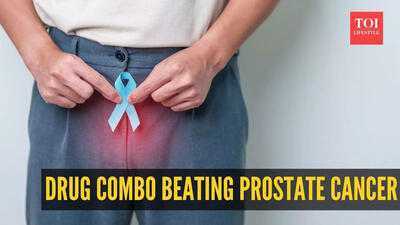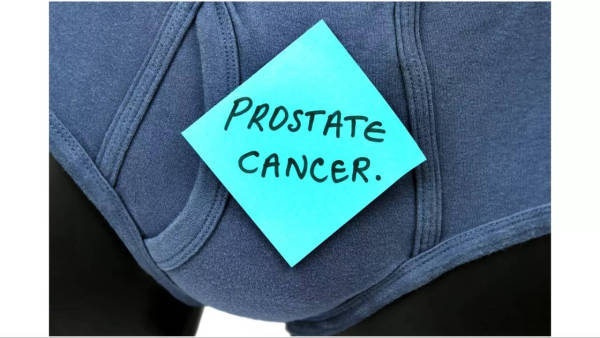40% boost in survival for men: Pairing two cancer drugs may reduce prostate cancer death risk
ETimes | November 10, 2025 2:39 PM CST

In a moment where medical innovation meets real-life impact, the recent findings from the , offer not just clinical news but a fresh lens on how men can engage with their health, lifestyle and future. The study has shown that pairing two drugs , namely Leuprolide (a testosterone-suppressing injection) and Enzalutamide (a pill that blocks residual effects of testosterone), results in a significant jump in survival for men with high-risk, recurring prostate cancer .
For many men, prostate health can feel like a silent guest in the room that is quietly monitored, occasionally remarked upon but rarely occupying headline-status in everyday life. This study turns that narrative slightly by showing how we engage with the body, the screen-time, the check-ups, the mindset and all of it can ripple into meaning.
The heart of the discovery
The study recruited more than 1,000 men across 17 countries who had undergone treatment for localised prostate cancer but then faced “biochemical recurrence”. In practical terms, their prostate-specific antigen (PSA) levels were climbing, even though no outward metastasis had yet been detected.
These men were at high risk, defined by a PSA doubling time of nine months or less. That matters because a faster doubling time signals a more aggressive disease course.
They were randomly assigned into one of three paths:
A combination treatment of Enzalutamide and Leuprolide
Leuprolide alone
Enzalutamide alone
After roughly 5 years of follow-up, the results were striking. In the combination group, 5-year metastasis-free survival was 87.3%, compared with 71.4% in the Leuprolide alone group (hazard ratio for metastasis or death: 0.42). Enzalutamide alone also outperformed Leuprolide alone (80.0% 5-year survival) with a hazard ratio of 0.63.

Put simply, combining the next-generation hormone therapy with standard hormone suppression significantly stacked the odds in favour of more men remaining metastasis-free for longer. Yet, it is not just the numbers that resonate, it is the lifestyle implications.
What this means for everyday life
Biochemical recurrence does not always feel dramatic as the body may seem “okay” and the day-to-day may look normal but the molecular clock is ticking. Recognising the importance of early detection, through PSA monitoring, consulting with urologists and staying attentive to subtle changes can turn a passive stance into an empowered one. This study proves that early, targeted intervention works.
Treatment advances don’t override wellness, they amplify it. While the study’s focus is medication, the lifestyle narrative remains central that men who are attentive to health, who keep their check-ups and who stay in conversation with their doctors, are better positioned. Moreover, treatments that prolong “metastasis-free survival” mean more years where quality of life matters that is during weekends with friends, travel, hobbies, meaningful roles and yes, less anxiety about the “when will it spread” question.
The mindset shift: From “let’s wait” to “let’s live”
One of the subtle takeaways is that when men know their health tools are evolving, there is less reason to feel resigned or passive. This becomes a story of maintenance and proactive wellbeing, not just “coping”. The combination therapy acts like an upgrade in the toolkit but the person holds the steering wheel.
Quality of life still matters very much. A common concern with aggressive treatments is, “At what cost?” The study carefully measured patient-reported outcomes (quality-of-life indices) and found no substantial deterioration in the combination group compared to standard therapy.

Wellness tip box: Even with advanced therapies, maintaining cardiovascular fitness, managing weight, controlling blood pressure, good sleep and moderating alcohol intake remain vital. This is the “soil” in which therapies thrive.
Bottom line
Health is not just about avoiding disease, it is about enabling life. With this new data as backdrop, the message transforms from “Will I beat this?” to “How will I live now?”
This study is more than an oncology milestone, it is a lifestyle pivot. It offers men and all of us interested in wellness, a clearer vision that proactive health is not just about eating better or exercising, it is about staying engaged, informed and intentional. When combined with advanced therapies like enzalutamide-plus-leuprolide, lifestyle becomes the foundation and medicine becomes the amplifier.
Note: The information provided in this article is for educational purposes only and is not intended as medical advice. Always consult with a qualified healthcare professional before starting any new medication or treatment and before changing your diet or supplement regimen.
For many men, prostate health can feel like a silent guest in the room that is quietly monitored, occasionally remarked upon but rarely occupying headline-status in everyday life. This study turns that narrative slightly by showing how we engage with the body, the screen-time, the check-ups, the mindset and all of it can ripple into meaning.
The heart of the discovery
The study recruited more than 1,000 men across 17 countries who had undergone treatment for localised prostate cancer but then faced “biochemical recurrence”. In practical terms, their prostate-specific antigen (PSA) levels were climbing, even though no outward metastasis had yet been detected.
These men were at high risk, defined by a PSA doubling time of nine months or less. That matters because a faster doubling time signals a more aggressive disease course.
They were randomly assigned into one of three paths:
After roughly 5 years of follow-up, the results were striking. In the combination group, 5-year metastasis-free survival was 87.3%, compared with 71.4% in the Leuprolide alone group (hazard ratio for metastasis or death: 0.42). Enzalutamide alone also outperformed Leuprolide alone (80.0% 5-year survival) with a hazard ratio of 0.63.

Put simply, combining the next-generation hormone therapy with standard hormone suppression significantly stacked the odds in favour of more men remaining metastasis-free for longer. Yet, it is not just the numbers that resonate, it is the lifestyle implications.
What this means for everyday life
Biochemical recurrence does not always feel dramatic as the body may seem “okay” and the day-to-day may look normal but the molecular clock is ticking. Recognising the importance of early detection, through PSA monitoring, consulting with urologists and staying attentive to subtle changes can turn a passive stance into an empowered one. This study proves that early, targeted intervention works.
Treatment advances don’t override wellness, they amplify it. While the study’s focus is medication, the lifestyle narrative remains central that men who are attentive to health, who keep their check-ups and who stay in conversation with their doctors, are better positioned. Moreover, treatments that prolong “metastasis-free survival” mean more years where quality of life matters that is during weekends with friends, travel, hobbies, meaningful roles and yes, less anxiety about the “when will it spread” question.
The mindset shift: From “let’s wait” to “let’s live”
One of the subtle takeaways is that when men know their health tools are evolving, there is less reason to feel resigned or passive. This becomes a story of maintenance and proactive wellbeing, not just “coping”. The combination therapy acts like an upgrade in the toolkit but the person holds the steering wheel.
Quality of life still matters very much. A common concern with aggressive treatments is, “At what cost?” The study carefully measured patient-reported outcomes (quality-of-life indices) and found no substantial deterioration in the combination group compared to standard therapy.

Wellness tip box: Even with advanced therapies, maintaining cardiovascular fitness, managing weight, controlling blood pressure, good sleep and moderating alcohol intake remain vital. This is the “soil” in which therapies thrive.
Bottom line
Health is not just about avoiding disease, it is about enabling life. With this new data as backdrop, the message transforms from “Will I beat this?” to “How will I live now?”
This study is more than an oncology milestone, it is a lifestyle pivot. It offers men and all of us interested in wellness, a clearer vision that proactive health is not just about eating better or exercising, it is about staying engaged, informed and intentional. When combined with advanced therapies like enzalutamide-plus-leuprolide, lifestyle becomes the foundation and medicine becomes the amplifier.
Note: The information provided in this article is for educational purposes only and is not intended as medical advice. Always consult with a qualified healthcare professional before starting any new medication or treatment and before changing your diet or supplement regimen.
READ NEXT
-
Airplane Mode: 5 Amazing Benefits of Airplane Mode, Which Most People Don't Know About..

-
UP Board 10th Science Sample Paper 2026: The UP Board 10th Science exam is for 70 marks; download the sample paper here.

-
If you haven't linked your Aadhaar with IRCTC, you won't get a confirmed seat. Quickly learn the process.

-
Tech: The easiest way to link Aadhaar with an IRCTC account is to book train tickets without any problem..

-
SEBI issues a warning regarding digital gold, saying, "Don't lose your senses in excitement!"
